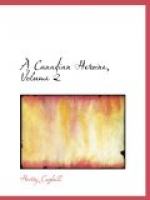It was now Monday evening, and on Wednesday they were to start. A letter from Maurice had arrived that morning—the first which he had written after receiving news from home, and it contained an enclosure to Mrs. Costello, which Lucia wondered her mother did not show her. But she would have wondered more, perhaps, if she had known why, in spite of the easily-read wistfulness in her glance, that note was so carefully withheld from her. It alluded, in fact, too plainly to the conversation in which, for the first time, Maurice had, just before going away, spoken to Mrs. Costello of herself and his affection for her. He said now, “My father has sent me an account of Miss Latour’s wedding, which he said he made Lucia describe to him for my benefit. But I have a curiosity to hear more about it, or rather about her. To tell the truth, I am longing for a letter from you, not only to bring me news of my father, but to satisfy me that all my hopes are not being built upon an impossibility. Is Percy still at Cacouna? Don’t laugh at me. My occupations here leave me plenty of time to think of you all, and I depend upon you not to let me be left quite in the dark on the subject to which I cannot help giving most of my thoughts.”
Mrs. Costello smiled to herself as she read; but she put off Lucia’s questioning with a very unfaithful summary of the contents of the note. It was certainly strange how much vague comfort she took in the knowledge of Maurice’s love for her child. It might have seemed that the same causes which had parted Lucia from Percy, and which she had said would part her from the whole world, would be just as powerful here; but the mother had at the bottom of her heart a kind of child-like confidence that somehow, some time, all must come right, and in the meantime she loved Maurice heartily, and wished for this happy consummation almost as much for his sake as for her daughter’s.
CHAPTER II.
There was a good deal of difference in the aspect of the country above and below Cacouna. Below it the river bank was high; and cultivated and fertile lands stretched back for a mile or two, till they were bordered and shut in by the forest. Above, the bank was low. Just beyond the town lay the swamp, which brought ague to the Parsonage and its neighbours. On the further side of this was the steam sawmill, and a few shanties occupied by workmen; and higher still, a road (called the Lake Shore Road, because, after a few miles, it joined and ran along the side of the lake) wound its way over a sandy plain, studded with clumps and knots of scattered trees or brushwood. Rough, stubbly grass covered a good deal of the sand, but here and there the wind had swept it up into great piles round some obstacle that broke the level, and on these sand-hills wild vines grew luxuriantly, covering them in many places with thick and graceful foliage, and small purple clusters of grapes. There were




